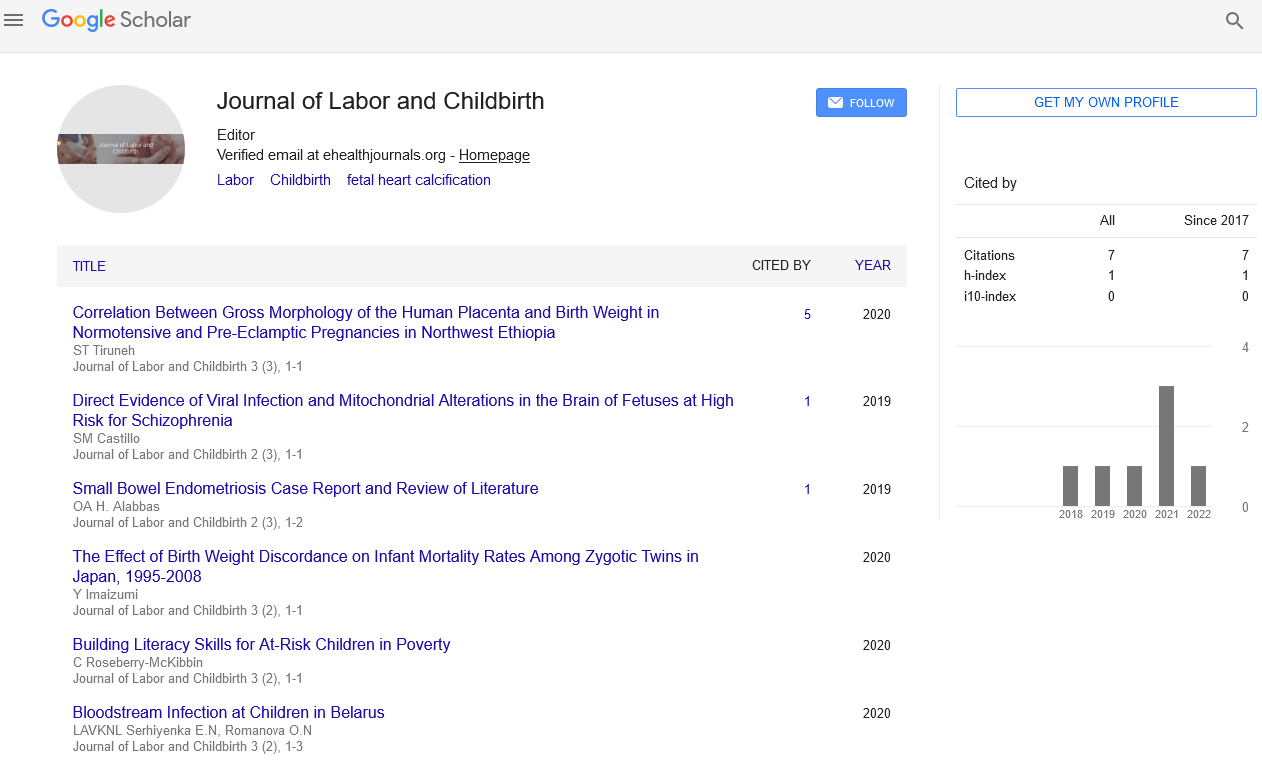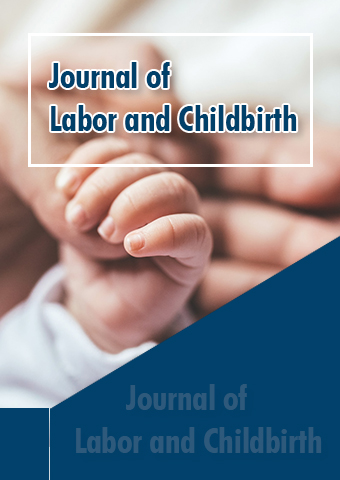Perspective - Journal of Labor and Childbirth (2023) Volume 6, Issue 6
A Condition of Adolescent Trauma during Childbirth
- Corresponding Author:
- Malin Edqvist
Department of Gynecology,
Shawan University,
Orebro,
Sweden
E-mail: malin.edvi8@ki.se
Received: 02-Nov-2023, Manuscript No. jlcb-23-119703; Editor assigned: 07-Nov-2023, PreQC No. jlcb-23-119703 (PQ); Reviewed: 21- Nov-2023, QC No. jlcb-23-119703; Revised: 07-Dec-2023, Manuscript No. jlcb-23-119703 (R); Published: 15-Dec-2023, DOI: 10.37532/jlcb.2023.6(6).158-159
Introduction
Childbirth is a transformative and often challenging experience for women. This complex and intricate event involves a series of physiological and emotional changes in both the mother and the baby, culminating in the awe-inspiring moment of delivery. But when it occurs during adolescence, the impact can be particularly profound. Adolescents, typically aged 10 to 19 years old, undergo physical, emotional and psychological changes as they transition from childhood to adulthood. The intersection of adolescence and childbirth can give rise to unique challenges and potential trauma that deserve careful consideration.
Description
The physical toll
Adolescents’ bodies are still developing and the physical demands of childbirth can be especially taxing. The risk of complications during pregnancy and childbirth is higher for teenage mothers compared to their older counterparts. Young bodies may struggle to cope with the stresses of labor, potentially leading to increased rates of medical interventions such as cesarean sections.
In addition to the physical toll on the body, adolescent mothers may face challenges related to inadequate prenatal care and nutritional deficiencies. These factors can contribute to a higher likelihood of preterm births and low birth weights, further complicating the childbirth experience for both the young mother and her baby.
Emotional and psychological strain
The emotional and psychological aspects of childbirth are complex for any woman, but for adolescents, the experience can be particularly overwhelming. Many teenage mothers may not have had the opportunity to fully comprehend the responsibilities and emotional demands that come with parenthood. The sudden shift from adolescence to motherhood can induce feelings of fear, anxiety and uncertainty.
Social stigma and isolation
Adolescent pregnancy often carries a significant social stigma, which can exacerbate the emotional challenges faced by young mothers. Judgment from peers, family members and society at large can contribute to feelings of shame and isolation. The fear of being ostracized may prevent young mothers from seeking the support they need during this critical time.
The importance of social support during childbirth cannot be overstated. For adolescents, having a strong support system can make a significant difference in their ability to cope with the challenges of childbirth and motherhood. Lack of support can lead to increased feelings of isolation, exacerbating the risk of postpartum depression and other mental health issues.
Educational disruptions
Adolescent mothers often face disruptions in their education due to the demands of pregnancy and childcare. The responsibilities of parenthood can make it challenging for young mothers to continue their education, potentially limiting their future opportunities. Educational disruptions contribute to a cycle of poverty and limited socio-economic mobility, creating additional stressors for adolescent mothers.
Trauma-informed care: A critical approach Recognizing the unique challenges faced by adolescent mothers during childbirth, healthcare providers must adopt a trauma-informed care approach. Trauma-informed care emphasizes creating a safe and supportive environment that recognizes and responds to the effects of trauma on individuals.
Empathy and compassion: Healthcare providers should approach adolescent mothers with empathy and compassion, acknowledging the potential trauma associated with childbirth. Creating a non-judgmental space where young mothers feel heard and supported is crucial in fostering positive mental health outcomes.
Education and counseling: Providing comprehensive education and counseling services to adolescent mothers can help them better understand the physical and emotional aspects of childbirth. Knowledge empowers young mothers to make informed decisions and fosters a sense of control over their birthing experience.
Building support networks: Encouraging the involvement of family members, friends and community support networks is essential. Establishing a strong support system can mitigate the feelings of isolation and stigma that adolescent mothers may experience.
Continuity of care: Ensuring continuity of care from prenatal to postnatal stages is vital. Consistent healthcare providers who are familiar with the unique needs of adolescent mothers can provide personalized and effective support throughout the childbirth journey.
Mental health services: Integrating mental health services into prenatal and postnatal care is critical. Screening for mental health issues, such as postpartum depression and providing timely interventions can significantly improve the wellbeing of adolescent mothers.
Addressing systemic challenges
Beyond individualized care, addressing systemic challenges is essential in mitigating adolescent trauma during childbirth. This includes advocating for comprehensive sex education programs, accessible healthcare services and social policies that support adolescent mothers.
Comprehensive sex education: Implementing comprehensive sex education programs in schools can empower adolescents with the knowledge and skills to make informed decisions about their sexual health. Education that includes discussions on contraception, consent and healthy relationships can contribute to lower rates of unplanned pregnancies.
Accessible healthcare services: Ensuring that adolescents have access to quality healthcare services, including reproductive healthcare, is essential. This involves removing barriers such as cost, transportation and stigma to encourage regular prenatal care and promote positive birth outcomes.
Social policies and support programs: Advocating for social policies that support adolescent mothers, such as parental leave, affordable childcare and educational accommodations, can contribute to breaking the cycle of poverty and improving long-term outcomes for both mother and child.
Conclusion
Childbirth during adolescence is a complex and multifaceted experience that requires a nuanced and compassionate approach. By adopting trauma-informed care practices and addressing systemic challenges, healthcare providers and policymakers can contribute to positive outcomes for adolescent mothers. Empowering young mothers with knowledge, support and resources is not only essential for their well-being but also for breaking the cycle of intergenerational challenges that may arise from adolescent childbirth. Through collective efforts, we can create a more compassionate and inclusive society that recognizes and meets the unique needs of adolescent mothers during the transformative journey of childbirth.

